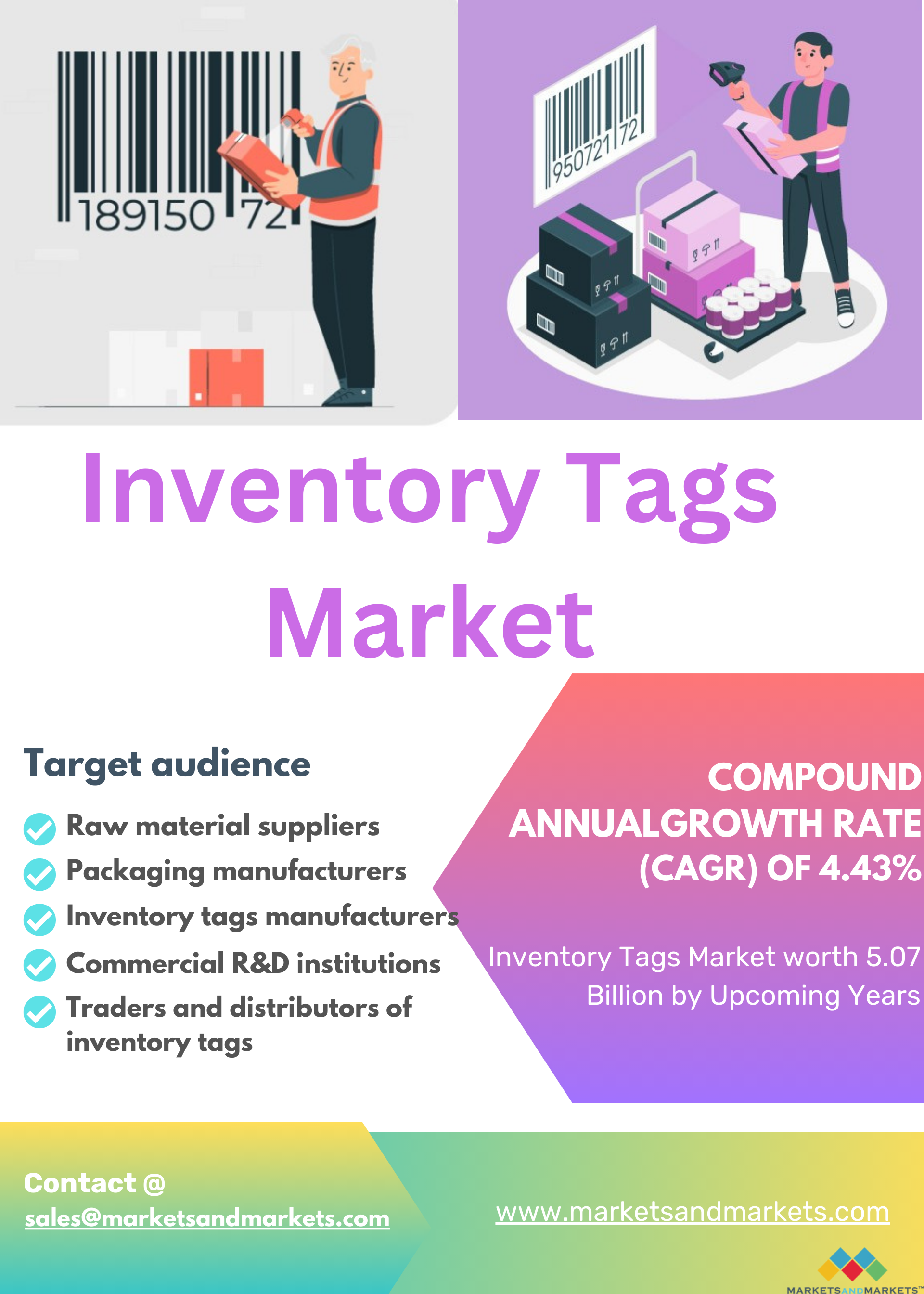The global supply chain management industry has been witnessing significant growth and advancements, driven by rapid technological developments and the increasing need for efficient inventory management. Among the various technologies making waves in this domain, inventory tags have emerged as a crucial tool for enhancing efficiency and tracking in supply chain operations. As the demand for real-time inventory tracking and management continues to rise, companies are increasingly adopting inventory tags to streamline their operations and gain a competitive edge. These tags offer several benefits, including improved accuracy, reduced manual efforts, enhanced data visibility, and better decision-making capabilities.
The market report offers a comprehensive analysis of the major service providers impacting the market are also provides the expert review, upcoming market trends, Inventory Tags Market size, share, growth, drivers, restraints & forecast.
Inventory tags, also known as #asset tags or #barcode tags, are hashtag#physical labels or electronic identifiers used to mark and track inventory items or assets throughout the supply chain. These tags can be attached directly to products, equipment, or containers, enabling seamless tracking and monitoring of their movement and status. They typically contain essential information, such as product codes, serial numbers, batch numbers, manufacturing dates, and other relevant data. The Inventory Tags market size is projected to grow from USD 4.08 Billion in 2016 to reach USD 5.07 Billion by upcoming years, at an estimated CAGR of 4.43%.
Get Free PDF Brochure: https://www.marketsandmarkets.com/pdfdownloadNew.asp?id=139388184
Key Players of Inventory Tags Market
The key players in the Inventory Tags Market are Avery Dennison Corporation (U.S.), Tyco International Plc. (Ireland), 3M Company (U.S.), Brady Corporation (U.S.), and Zebra Technologies Corporation (U.S.). The other players in the market are Checkpoint Systems Inc. (U.S.), Smartrac N.V. (The Netherlands), Cenveo Inc. (U.S.), Alien Technology Inc. (U.S.), and Hewlett-Packard Company (U.S.). These players have adopted various strategies to expand their global presence and increase their market share. Investments, agreements, contracts, expansions, acquisitions, new product launches, and technological developments are some of the major strategies adopted by the market players to achieve growth in the Inventory Tags Market.
Growing Need for Efficient Inventory Management
In today's highly competitive business landscape, efficient inventory management plays a crucial role in optimizing operational processes and reducing costs. Inventory tags provide companies with real-time visibility into their inventory levels, helping them make informed decisions and avoid stockouts or overstock situations. By using inventory tags, businesses can accurately monitor stock movement, trace the product's journey from the manufacturer to the end consumer, and manage stock levels effectively.
Advantages of Inventory Tags
- Enhanced Inventory Control: Inventory tags enable companies to implement robust inventory control measures. With accurate tracking of goods and assets, businesses can optimize inventory levels, prevent theft or misplacement, and improve overall supply chain efficiency.
- Real-time Tracking: Thanks to advancements in RFID (Radio Frequency Identification) technology, inventory tags allow real-time tracking of products and assets. This level of visibility ensures that businesses can quickly locate items, identify potential bottlenecks, and respond proactively to any supply chain disruptions.
- Improved Data Accuracy: Manual data entry is prone to errors, which can lead to costly mistakes in inventory management. Inventory tags eliminate the need for manual data entry by providing automated data capture, ensuring data accuracy and integrity.
- Streamlined Auditing and Compliance: Inventory tags simplify the auditing process by providing an organized and systematic approach to tracking assets and inventory. This level of organization enhances compliance with industry regulations and standards.
- Efficient Order Fulfillment: With accurate inventory data, businesses can streamline their order fulfillment processes. Inventory tags help in locating products quickly, reducing order processing times, and increasing customer satisfaction.
- Optimized Supply Chain Performance: By providing valuable insights into supply chain operations, inventory tags contribute to better decision-making and optimization of supply chain performance. Companies can identify areas for improvement, eliminate bottlenecks, and enhance overall efficiency.
Speak to Analyst: https://www.marketsandmarkets.com/speaktoanalystNew.asp?id=139388184
Applications of Inventory Tags
The application of inventory tags spans across various industries, including retail, manufacturing, healthcare, logistics, and more. Some of the key applications include:
- Retail: Retailers use inventory tags to track product movement, manage stock levels, and improve inventory accuracy. This leads to reduced instances of stockouts and overstock situations, ensuring smooth operations and an enhanced customer experience.
- Manufacturing: In manufacturing facilities, inventory tags play a critical role in managing raw materials, work-in-progress goods, and finished products. They help streamline production processes, reduce lead times, and ensure just-in-time inventory management.
- Healthcare: Healthcare facilities use inventory tags to track medical equipment, supplies, and pharmaceuticals. This helps prevent losses due to misplaced or stolen items and ensures that critical supplies are readily available when needed.
- Logistics and Transportation: Inventory tags assist logistics and transportation companies in monitoring goods throughout the supply chain. They provide real-time information about the location and condition of shipments, allowing for timely deliveries and efficient route planning.
Request for New Version: https://www.marketsandmarkets.com/RequestNewVersion.asp?id=139388184
Inventory Tags Market Segmentation
This research report segments the inventory tags market into following submarkets:
By Printing Technology:
- Digital printing
- Flexography printing
- Gravure printing
- Screen printing
- Lithography printing
- Offset printing
- Letterpress printing
- Others (thermal printing and pad printing)
By Technology:
- Barcodes
- RFID
- Others (QR codes and normal tags)
By Label Type:
- Plastic
- Paper
- Metal
- Others (glass labels, cloth labels, and thermal label type)
Inquire Before Buying: https://www.marketsandmarkets.com/Enquiry_Before_BuyingNew.asp?id=139388184
By End-Use Sector:
- Industrial
- Retail
- Others (aerospace, marine, and gifts)
By Region:
- North America
- Europe
- Asia-Pacific
- RoW
Barcodes is projected to be the largest market segment of the Inventory Tags Market during the forecast period
Track & trace and authentication technologies such as barcodes and RFID are some of the technologies used by companies to track their inventory. Barcode technologies are the most conventional and prominent technologies used in the Inventory Tags Market. This segment dominated the Inventory Tags Market in 2015, and this trend is projected to continue through 2021. In current economic conditions, retailers and manufacturers recognize that additional investments in loss prevention is necessary to combat the increasing level of inventory loss due to theft and counterfeiting. Logistics & transportation companies also benefit by using track & trace technologies as they can locate the package at any point during the delivery process. Track & trace technologies such as RFIDs and barcodes help in identifying the product as well as help in tracing the product across the supply chain.

